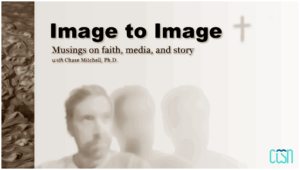 Column: Image to Image: Musings on Faith, Media, and Story
Column: Image to Image: Musings on Faith, Media, and Story
September entry: “Speak to Know, Listen to Be Known”
Column Description: Image to Image: Musings on Faith, Media, and Story is a monthly column that illuminates old and new ideas about media ecology from a Christian perspective. Dr. Mitchell will explore what it means to bear God’s image and Christian witness in a mediated world, with a particular focus on the relationships between theology, media, and orthopraxy across different Christian traditions.
By Chase Mitchell, Ph.D.
Assistant Professor of Media and Communication, East Tennessee State University
September 2023 / June 2023 / January 2023 / September-October 2022 / July 2022 / June 2022 / April-May 2022 / January 2022 / November 2021 / October 2021 / September 2021
SEPTEMBER 2023
Speak to Know, Listen to Be Known
I know the idea is counterintuitive: speaking to know and listening to be known. Let me explain.
As the semester has recently begun, I’ve reentered that strange headspace, familiar to teachers, in which the ability to listen is made harder by the impetus to speak. I’m supposed to talk, after all, to profess, about the thing it is my students are paying to learn.
Speaking doesn’t come naturally to me. Most often, I’m happy to observe, to listen, to be the one who sees and hears what others are doing and saying. Standing in front of a class of students drains me of mental energy; not because it’s especially difficult to formulate and articulate the requisite content, but because the attention it garners makes me self-conscious of the many false assumptions that are inevitable in such an interaction.
We’re all misjudged by others in some way, of course, in nearly every encounter. That’s normal and fine. No-one really knows who I am, totally, and that’s to be expected. Communication, no matter how articulate, comprehensive, or intimate, always falls short of its intended goals. I will never be able to express who I am to others, in full, because identify, though shaped by and fundamentally grounded in relationship, is ultimately veiled by the multitudinous varieties of human experience.
Our inability to be known isn’t surprising. Stranger, though, is that as I try to project my identity to an audience, the further removed I feel from myself. I’ve discovered a deep-seated force at work. There’s a misalignment of who I know I am (or hope to be), and the version of myself that I present to others. I’m not lying or being deceptive when I address a group of students; that’s not what I’m talking about. What I mean is that public speaking exacerbates and brings into sharper focus an intuition that I’ve noticed creep into even one-on-one conversations with those who know me best. That is, the mystery of being, of identity, is not borne primarily by my inability to communicate with others, but rather from some fundamental dysfunction within myself.
As I speak, sometimes even as the words escape my mouth, I’m already thinking, “Why am I saying this?” Or, “why am I putting it like that?” At some deep level, I know that what I’m saying doesn’t accurately reflect who I am. It does reflect who I am, of course, in the literal sense that it’s who I am in the moment. But the uneasiness I feel in this seeming foreign self is evidence, I think, of sin at work in me. As Paul said, I do what I ought not, and I don’t do what I ought. In Christ, my spirit groans as the flesh struggles, to attain unto righteousness, in a fallen vessel that is as yet a work-in-progress.
I don’t mean to forward a gnostic sense of identity—as in some dualistic distinction between what is and what should be—but rather to suggest that communicative angst is less about relational distance between persons, and more about one’s relational communion with the Triune God. To know thyself, that is, only happens insofar as one abides in loving grace of Father, Son, and Holy Spirit. The more I submit my identity to the Savior, the more I subsume myself in His love, the more clearly He reveals me to myself. Strange, I know, but true. Only then, as I die to who I think I am, can I begin to communicate that identity to others.
What I know, when I speak, is that I am a mystery, perhaps as much to myself as to others. What I find when I listen is that I am only known, fully and truly, by the love revealed in Christ.
Even as we continue to struggle, in the fray, we may abide in peace and hope, affording grace in the knowledge that in the fullness of time others will come to know us as Christ now knows us. We, too, will know as we are known. Deep calls to deep.
